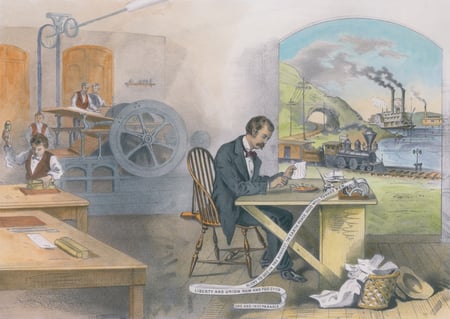If we consider a consultant as someone who advises decision-makers, they have been around since the dawn of antiquity – Marco Polo, Colbert, Hamilton, the brother of the leader of the Cave Bear Clan. Ok, so that last one may be a stretch, but the point is: There have always been consultants.
So why aren’t we better at using them?
Or to put it another way, many people today are still trying to offer fast fixes and slap-dash solutions. We know that slapping a Snoopy Band-Aid over an arterial wound won't staunch the hemorrhaging. And yet again and again, that's exactly what we do when nasty, pointy problems arrive on our corporate doorstep. Often, we avoid getting an expert in to fix the heart of the problem.
Why?
Well, a big part of the answer is that true "supply chain consultants” are hard to find. We’ll get to how that impacts your supply chain, but first, let us tarry to coal-grimed Europe at the end of the 19th Century and the start of the industrial revolution.
Things got technical
 In late 1800s Europe, life got more complicated.
In late 1800s Europe, life got more complicated.
As manufacturing became "technical," these processes required larger groups of differently skilled people. Work that could once be performed by an adept village craftsman now called for processes, machinery, and careful team organization. Suddenly, business owners needed advisers and inventors to help them navigate uncharted industrial waters. Things got technical.
Interestingly, the birth of standardized shipping came soon after industrialization, when specialized goods needed to travel further afield. No coincidence there.
So you see, right from the beginning industrialization and logistics have walked hand in hand. Industry has continued to develop, and many argue we are now in the segmentation and specialization era, where companies focus on industry verticals, such as manufacturing and logistics.
Logically, it followed that consultants specialized right alongside the burgeoning complexity of manufacturing and business.
Here we are in 2023
And supply chain consulting is deeply technical.
Yes, big consulting houses can take a birds-eye view, but only supply chain consultants can understand and advise on the nitty-gritty necessary to build operational resilience, craft an effective and tailored TMS, and add agility to logistics.
Whether you're at the beginning of the process and just getting to know us or you've been a customer for a decade, our consulting approach is at the forefront of everything we do.
Let's hear from the folks at the front lines – sales.
Consultants from the start
Once the team establishes an initial connection, one of our expert VPs steps in. Brooks Wise, VP of Sales, explains how we approach with a consulting mindset, even from that first conversation.
“We take our conversations beyond a freight rate. Our approach and expertise allow us to study the prospect’s supply chain and provide operational efficiencies, visibility and measurability across many departments within their organization, not just shipping,” Brooks says.
Brooks maintains that success (ours and theirs) runs hand-in-hand. “We treat your business as if it is our business. We want you to achieve your profit goals. If we are not uncovering ways to increase your profits through improved supply chain efficiencies and cost reduction, we are not successful.”
In the thick of it with continuous improvement

We work what we call the continuous improvement process, which means we never look the other way and let things run their course once we've onboarded a client. Completely the opposite is true, in fact. We're in the thick of it, in their business – in ALL the areas of their business – looking for ways to constantly make it more streamlined and efficient. Often, these opportunities aren't where you'd expect them.
Once a client's business matter has been identified, whether it be impactful or something needing a minor resolution, the team documents, tracks and assigns it to a task team, a joint force encompassing both IL2000 and customers. They resolve these issues, enter the learnings into our archive of experiences and look for the next problem to solve or procedure to improve. And the process is ongoing. Because business/industry/economy/manufacturing is constantly evolving, and supply chain management with it.
Specialized consulting is the key
Big consulting groups house thousands of people from every business area, from financial and IT to human resources and strategy. There is a time and place when you should invest in working with them – for example, if you face crosscutting challenges involving R&D, manufacturing or production. But you won’t be working with any supply chain specialists, which means you’ll only get a basic supply chain review. You’ll still need to drive your own optimization process.
But because good consultants are hard to find, many companies mistakenly assume the big consulting house is the only option.
This is far from the case. IL2000 specializes in supply chain management, a holistic process that considers your complete supply chain, not just one piece of the puzzle. It’s this value-added logistics-as-a-service (LaaS) function that goes well beyond the typical experiences of working with major consulting firms.
We assume you’ve gotten that point by now, so we won’t emphasize that we do one kind of consulting or that our team comprises leading specialists in the field. However, we will summarize by saying IL2000 is a logical choice if your supply chain is complex or you need an intricate deep dive into customized supply chain solutions.
The table below gives a more detailed overview of the elements encompassed in supply chain consulting and how we stack up against generalized consulting houses.

While we're making comparisons, it's worth noting that rate brokers or carriers are not good partners for optimizing your supply chain either. You can read more on our Services: Us vs. Them page if you'd like a breakdown of all the different areas of operations support, technology, and financial services & reporting that we cover, compared to big consulting houses, carriers and rate brokers flooding the market.
Age-old but not aged
While advising is an age-old occurrence, being a specialized supply chain and logistics consultant is anything but old and tired. We have over two decades of experience to build on and always look ahead to ensure your business profits from changes in the market as, or even before, they happen. You’ll never play catch up if your consultants work across a broad spectrum of industries and use data analytics to understand the nuances of logistics in those ever-fluid markets.
The first step is understanding your specific needs. To do that, we start with thorough data analysis and discovery of your entire supply chain, with no obligation and no cost for you.
Let us help. Start the process with a no-obligation supply chain analysis.

